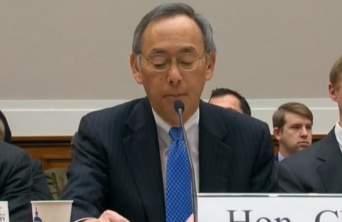Solyndra Loan: Sound Investment Or Bad Politics?
On Nov. 17, Energy Secretary Steven Chu appeared before congress to discuss his approval of a half-million dollar loan guarantee to now-bankrupt solar power company Solyndra.
House Energy and Commerce Committee Chairman Rep. Cliff Stearns, who is leading the investigation along with Rep. Fred Upton, said Chu's actions make it "readily apparent that senior officials in the administration put politics before the stewardship of taxpayer dollars."
Although Chu accepted responsibility for the loan, he firmly denied any accusation of political intent.
"As the Secretary of Energy, the final decisions on Solyndra were mine, and I made them with the best interest of the taxpayer in mind," said Chu, according to the Huffington Post. "I want to be clear…Over the course of Solyndra's loan guarantee, I did not make any decision based on political considerations."
WATCH:
Republicans began investigating the approval process of the Solyndra loan when the solar energy company announced its financial troubles nearly nine months ago. Now, they are accusing the Department of Energy of financial mismanagement and political intent in promising Solyndra the $535 million.
At the hearing, the republicans on the committee pointed out that a foundation belonging to George Kaiser, a billionaire fundraiser for Obama, was one of Solyndra's largest investors. When Chu claimed he did not know who Kaiser was when the loan was approved, Rep. Joe Barton balked.
"Everybody and their dog at DOE knew who he was and what he was involved in," said Barton, according to the Associated Press. "We have on the record that he was around the White House at least 16 times in the time period the Solyndra loan program was being reviewed."
Kaiser has denied lobbying for the solar company, however the Associated Press said emails released last week show that Kaiser discussed Solyndra's situation with the White House on at least one occasion.
Besides political intent, Republicans also said Chu ignored financial warning signs when the decision to fund Solyndra was made in 2009.
Chu said he could not have predicted Solyndra's financial future. Soon after the investment was made, the price of its solar products fell by 70 percent due to a decrease in demand and an increased production of similar products in China.
"This company and several others got caught in a very, very bad tsunami," said Chu, according to the New York Times.
Chu made it clear that the government will not be seeing much return on its investment.
Stearns and Upton said the investigation will continue. However, Rep. Henry Waxman, the ranking Democrat on the committee, commented that the way Stearns and Upton are conducting the investigation seem to have political intent rather than a focus on any misconduct.
"It's time for House Republicans to stop dancing on Solyndra's grave and start getting serious about clean energy policy," said Waxman, according to the Washington Post.






